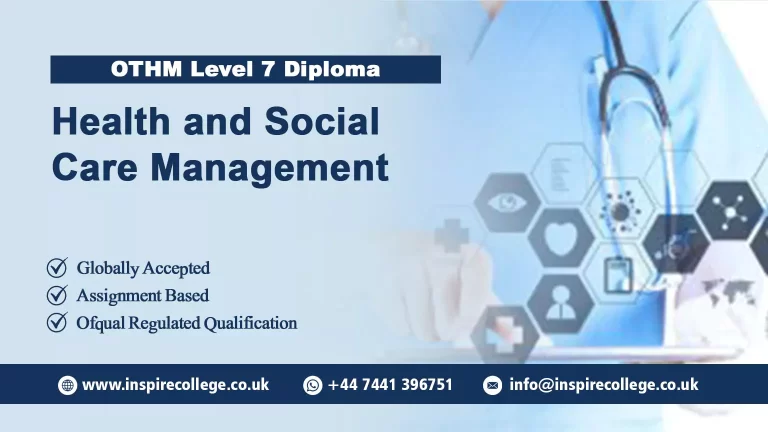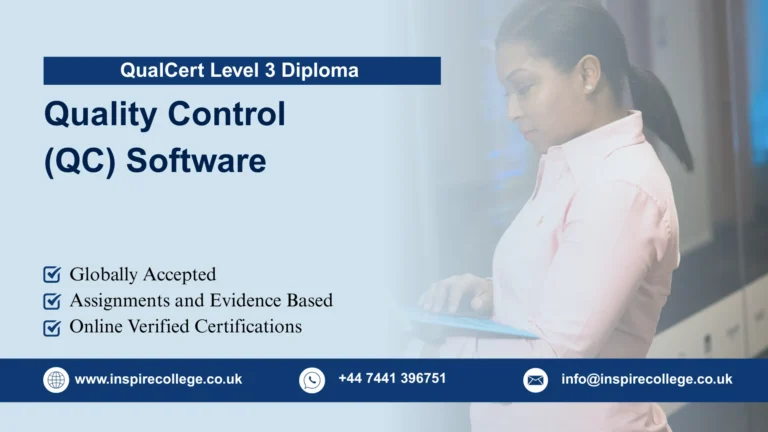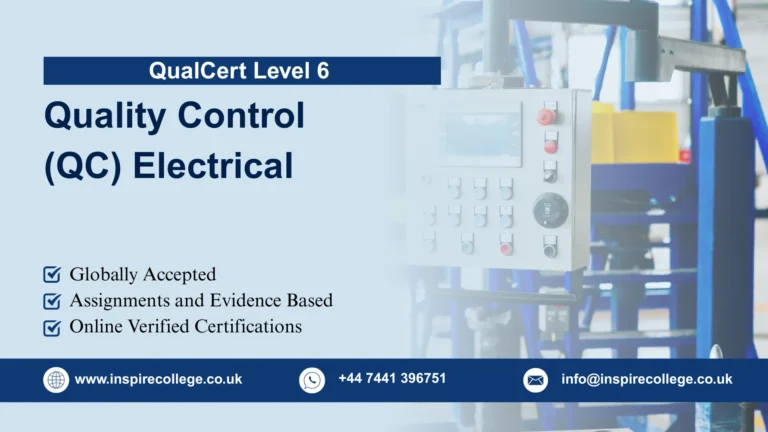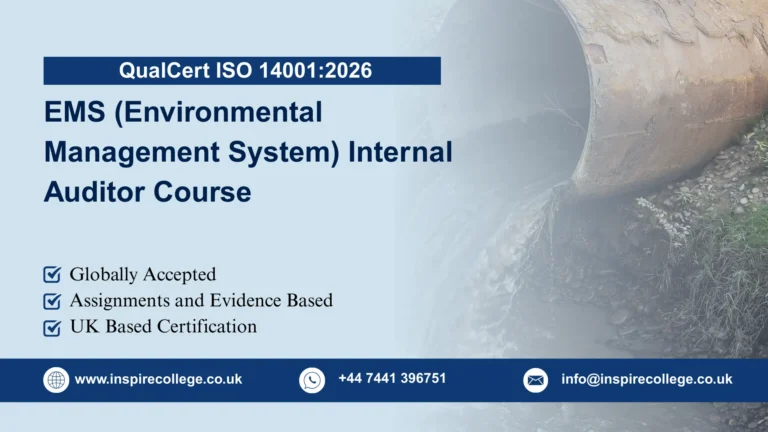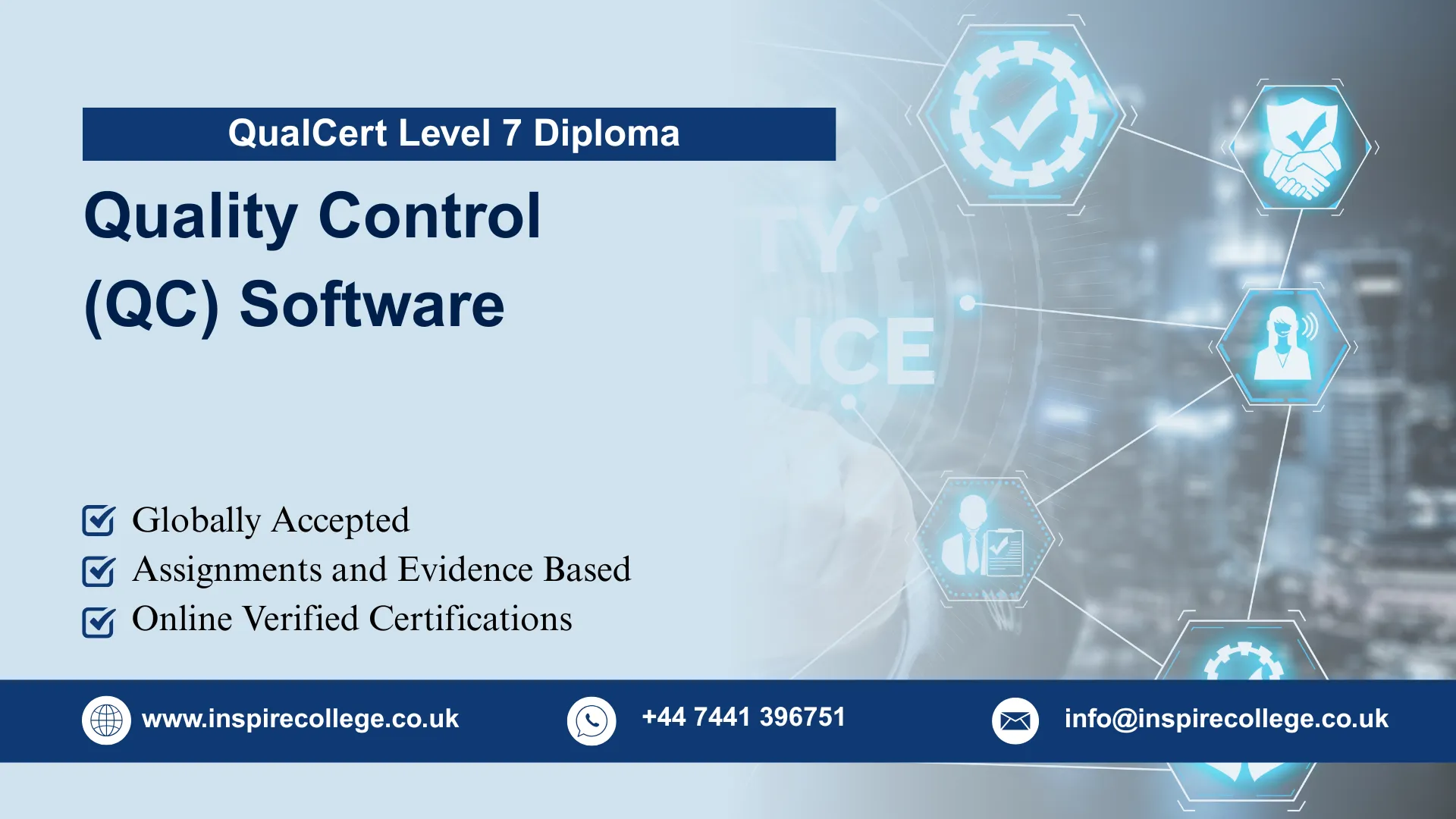
QualCert Level 7 Diploma in Quality Control (QC) Software
The QualCert Level 7 Diploma in Quality Control (QC) Software is a prestigious qualification designed to meet the growing demand for advanced expertise in software-driven quality assurance and process improvement. In today’s fast-paced industries, the role of quality control software has become indispensable in ensuring compliance, enhancing productivity, and maintaining global standards across manufacturing, engineering, healthcare, and technology sectors.
QualCert Level 7 Diploma in Quality Control (QC) Software provides learners with an in-depth understanding of quality management systems, software testing, automation tools, and digital compliance frameworks that are vital in modern business environments. QualCert Level 7 Diploma in Quality Control (QC) Software explores advanced methodologies in statistical process control (SPC), risk management, Six Sigma applications, and software validation techniques, equipping learners with both the theoretical foundation and practical skills required to optimize quality processes.
By enrolling in QualCert Level 7 Diploma in Quality Control (QC) Software, learners will gain the ability to design, implement, and evaluate quality control software solutions that align with international standards. The qualification also emphasizes critical problem-solving, data analysis, and strategic decision-making—skills highly valued by employers in quality assurance, IT project management, and regulatory compliance.
The QualCert Level 7 Diploma in QC Software is ideal for professionals, engineers, and managers seeking to advance their careers by mastering cutting-edge tools and frameworks in quality assurance. It prepares graduates to play a pivotal role in driving organizational excellence, achieving operational efficiency, and ensuring sustainable quality practices in a competitive global market.
The QualCert Level 7 Diploma in Quality Control (QC) Software is an advanced qualification designed for professionals who already possess a solid background in software development, quality assurance, or related fields. To ensure learners are adequately prepared to engage with the advanced concepts and technical applications within this program, applicants are expected to meet the following entry requirements:
Academic Qualification
- A bachelor’s degree or equivalent in software engineering, computer science, information technology, or a related field.
- Ensures applicants have the academic foundation to handle advanced quality control and software concepts.
Professional Experience
- Minimum of three years of relevant professional experience in software quality control, software testing, quality assurance, or related disciplines.
- Provides learners with practical context for applying advanced methodologies and frameworks.
Language Proficiency
- Strong command of the language of instruction (typically English).
- Required to fully understand technical concepts, course materials, and assessments.
Technical Familiarity
- Prior knowledge of software testing tools, quality management systems, and industry best practices.
- Recommended to help learners adapt quickly to advanced course content and applications.
Alternative Pathways
- Candidates without a formal degree but with extensive industry experience may be considered.
- Admission is evaluated on a case-by-case basis to recognize professional expertise in place of academic qualifications.
Mandatory Units
The QualCert Level 7 Diploma in Quality Control (QC) Software offers 60 Credits, requiring a Total Qualification Time (TQT) of 300 hours, including 210 Guided Learning Hours (GLH). The highest-level diploma that focuses on leadership, coordination, and advanced life support techniques.
- Quality Control Strategy and Leadership
- AI-Driven QC Systems for Industry
- Global Best Practices in QC Software
- Governance, Risk, and Compliance in QC
- Big Data and QC Decision Making
- Innovation and Future Trends in QC Software
The QualCert Level 7 Diploma in Quality Control (QC) Software is structured into specialized units that provide learners with advanced knowledge, practical skills, and strategic insights into modern quality assurance practices. Each unit addresses a critical area of software quality control, blending theoretical frameworks with real-world applications to prepare professionals for leadership roles in the digital era.
Quality Control Strategy and Leadership
- Develop Advanced QC Strategies
- Design and implement sophisticated quality control strategies tailored to modern software development environments.
- Lead QA Teams Effectively
- Apply leadership principles to manage and inspire software quality assurance teams, ensuring productivity and collaboration.
- Integrate QC into the SDLC
- Seamlessly embed quality control processes throughout the software development lifecycle for maximum efficiency and reliability.
- Analyze and Mitigate Risks
- Identify, evaluate, and reduce software quality risks to improve product dependability and customer satisfaction.
- Strategic Decision-Making
- Enhance decision-making abilities by applying advanced strategic quality management techniques and frameworks.
AI-Driven QC Systems for Industry 4.0
- Role of AI in QC
- Understand how artificial intelligence is transforming modern quality control across industries.
- AI-Driven Testing and Detection
- Implement intelligent testing systems and defect detection techniques powered by AI.
- Machine Learning Models
- Use machine learning algorithms to optimize software testing, defect prediction, and error resolution.
- Evaluate AI Accuracy
- Assess the performance and accuracy of AI-powered quality assurance tools for continual improvement.
- Adapt to Industry 4.0
- Align quality control systems with the digital transformation demands of Industry 4.0 technologies.
Global Best Practices in QC Software
- Apply International Standards
- Implement globally recognized quality control frameworks such as ISO, CMMI, or Six Sigma.
- Best Practices in Testing
- Evaluate, adapt, and apply international best practices for software testing, validation, and verification.
- Regulatory Compliance
- Ensure that software systems comply with diverse global industry standards and legal requirements.
- Continuous Assessment
- Enhance quality management processes through ongoing monitoring and performance assessment.
- Benchmarking
- Compare organizational quality metrics with global leaders to identify improvement opportunities.
Governance, Risk, and Compliance in QC
- Governance Frameworks
- Develop governance structures to oversee and guide quality assurance processes effectively.
- Risk Identification
- Detect and analyze risks linked to software quality, security, and operational efficiency.
- Compliance Assurance
- Ensure adherence to industry-specific standards, certifications, and compliance requirements.
- Risk-Based QC Approaches
- Implement proactive, risk-based quality control methods to manage software projects more effectively.
- Audit Strengthening
- Build robust auditing and compliance mechanisms to reinforce accountability in software quality assurance.
Big Data and QC Decision Making
- Big Data for QC
- Harness big data analytics to improve software testing, defect tracking, and quality outcomes.
- Data-Driven Insights
- Leverage analytics for defect prevention, resolution, and overall process optimization.
- Predictive Analytics
- Apply predictive models to anticipate defects and proactively implement quality measures.
- Optimize Testing Strategies
- Use large-scale data analysis to design and refine efficient testing strategies.
- Visualization Techniques
- Enhance quality-related decision-making through advanced data visualization and reporting methods.
Innovation and Future Trends in QC Software
- Emerging Technologies
- Explore how innovations such as cloud computing, blockchain, and edge computing are influencing QC.
- Impact of Automation & AI
- Assess how automation and AI are reshaping traditional quality assurance practices.
- Foster Innovation
- Encourage creativity and innovation within teams to design next-generation QC methodologies.
- Future Challenges and Opportunities
- Anticipate upcoming challenges and identify opportunities in software quality control.
- Adaptive Strategies
- Develop flexible strategies to stay aligned with continuous technological change and global trends.
The Level 7 Diploma in Quality Control (QC) Software is tailored for ambitious professionals who aim to master advanced quality assurance techniques and play a key role in delivering reliable, high-performing software solutions. This program is suitable for:
- Quality Assurance Professionals
- Individuals currently working in QA roles who want to expand their expertise in advanced quality control frameworks, methodologies, and tools.
- This course equips them with the skills to lead complex testing environments, implement international standards, and ensure end-to-end software reliability.
- Software Developers
- Developers who wish to broaden their understanding of quality assurance to improve the robustness of their applications.
- It also suits those considering a transition into quality-focused roles, enabling them to integrate best practices for producing defect-free, high-quality software.
- Project Managers
- Project managers responsible for overseeing software development projects who require strong knowledge of quality control.
- The program provides the skills to align quality processes with project goals, manage risks, and guarantee that deliverables meet client expectations.
- IT Managers and Leaders
- Senior IT professionals tasked with establishing and enforcing quality standards across teams or departments.
- This diploma helps them implement governance frameworks, lead quality initiatives, and adopt innovative practices to maintain organizational excellence.
- Quality Control Specialists
- Professionals dedicated to quality control who want to specialize further in software-specific assurance practices.
- Learners gain expertise in areas such as automated testing, AI-driven QC tools, and advanced compliance mechanisms.
- Consultants
- Consultants providing advice on software quality and organizational processes who want to strengthen their credentials.
- The program expands their skill set, enabling them to deliver more comprehensive and industry-aligned solutions to clients.
- Career Changers
- Professionals from related IT fields who wish to transition into software quality control.
- The diploma provides advanced theoretical and practical knowledge that helps them build credibility and secure roles in this growing sector.
- Academic and Research Professionals
- Researchers and educators engaged in software engineering, IT management, or quality assurance studies.
- The course helps them stay updated with the latest QC frameworks, AI applications, and global best practices for teaching or scholarly research.
Register Now
QualCert Level 7 Diploma in Quality Control (QC) Software


